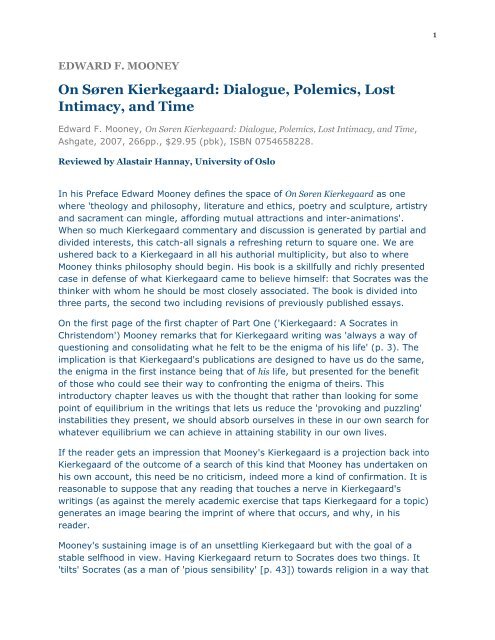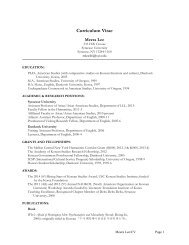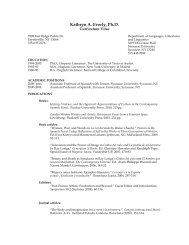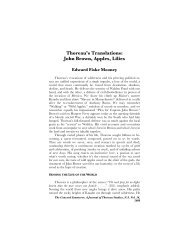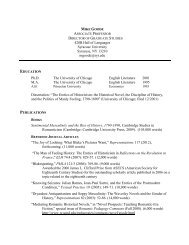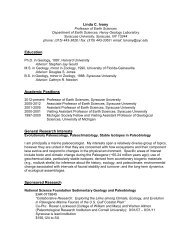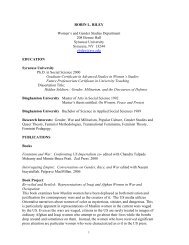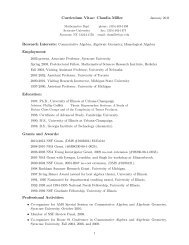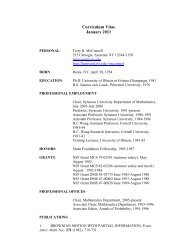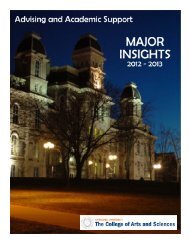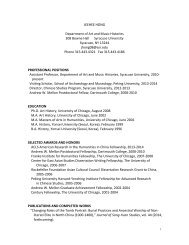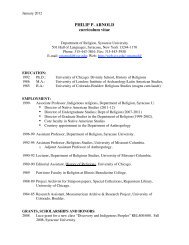Hannay's review of On Soren Kierkegaard
Hannay's review of On Soren Kierkegaard
Hannay's review of On Soren Kierkegaard
Create successful ePaper yourself
Turn your PDF publications into a flip-book with our unique Google optimized e-Paper software.
2his reputation as a secular iconoclast tends to prevent, but also highlights<strong>Kierkegaard</strong>'s own early involvement with Socrates. We thus form a picture <strong>of</strong> himas a thinker inspired from the start less by irony than by love and by philosophy,indeed (as in Plato's Symposium) by philosophy as love. The irony has good work todo, in <strong>Kierkegaard</strong>'s case that <strong>of</strong> clearing away the complacent and muddleddefinitions <strong>of</strong> what the citizens <strong>of</strong> Copenhagen were content to believe it was to bea Christian. The Socratic element is visible in <strong>Kierkegaard</strong>'s failure, or ratherrefusal, to provide any alternative blueprint. Yet another sign is the ironicalambiguity <strong>of</strong> his (late) denial that he himself was a Christian (p. 27). Mooneyaccordingly (chapter 3) identifies Socrates as the mold in which the young<strong>Kierkegaard</strong> was able to form and mobilize his unusual mix <strong>of</strong> talents. Mooney alsohas Socrates provide the answer to that famous longing <strong>of</strong> the twenty-two year oldstudent for something for which he could 'live and die' (p. 37). Further Socraticanalogies include Socratic ignorance and reticence about truth. In <strong>Kierkegaard</strong> thistakes the form <strong>of</strong> moving the onus <strong>of</strong> belief in truth onto the individual.Against the grain <strong>of</strong> the conventional take on <strong>Kierkegaard</strong>'s Socrates, due to theClimacus pseudonym, as representative <strong>of</strong> a 'pagan' position against which trueChristianity is sharply defined, the Socrates we meet in Mooney is as good as aChristian (though for obvious reasons not able to be one literally at the time). Part<strong>On</strong>e concludes with a chapter arguing that although Plato's Socrates and<strong>Kierkegaard</strong> addressed radical wrongs in their own societies, both are speakinguniversally to any world suffering from the same malady: loss <strong>of</strong> subjectivity. Thelife-work to which, as the new Socrates, <strong>Kierkegaard</strong> devotes his talents is a revival<strong>of</strong> our ability to respond to the 'religious, moral, and aesthetic demands that appealto us as initiates <strong>of</strong> poetry, wonder, grief, and love' (p. 85). His writings seek to reignitethe vital spark <strong>of</strong> inwardness in the form <strong>of</strong> a non-propositional (p. 64) selfknowledge,calling for the cultivation, or retrieval, <strong>of</strong> a moral sensitivity in the face<strong>of</strong> everything that we let society put in its path (for instance fashion and learning).The five chapters <strong>of</strong> Part Two ('Love, Ethics, and Tremors in Time') go more directlyto the works themselves. The first employs dicta from Works <strong>of</strong> Love that allowMooney to find support in <strong>Kierkegaard</strong> himself for his own positive (and trusting)portrait <strong>of</strong> its author. Here Joakim Garff's Biography is taken to task (selectively,Mooney admits) for its less than charitable portrayal and use <strong>of</strong> the texts. From TheConcept <strong>of</strong> Anxiety we then have the objectively impossible but crucial idea <strong>of</strong> the'glance', or 'instant' (Øjeblikket as in the German Augenblick), as the initial glimpse(a meeting <strong>of</strong> the eternal in time) <strong>of</strong> hope <strong>of</strong> the restoration or 'repair' <strong>of</strong> ourselves. Following this, Either/Or is rescued from Alasdair MacIntyre's muchcommentedupon 'radical choice' reading. The work is re-contextualized on thebackground <strong>of</strong> the need to live out options and to educate the will, so thatcommitment (rather than choice as just a shot in the dark) can be real and notabstract. Mooney follows up with a discussion <strong>of</strong> the 'communicative strategies'
3needed by those who want to tell about their commitments but in a way thatpresents the options as real and not abstract to those they would like to enlighten.Each <strong>of</strong> the last two chapters <strong>of</strong> Part Two deals with a famous pair <strong>of</strong> works thatsucceeded Either/Or. The 'lyrical' part <strong>of</strong> Fear and Trembling is a form <strong>of</strong>entertainment, with hero-worship <strong>of</strong> Abraham and the thrill <strong>of</strong> the 'shudder <strong>of</strong>thought'. The dialectical second part serves the cautionary purpose <strong>of</strong> telling uswhere not to look, or rather not to look at all, if we are to grasp the promise <strong>of</strong> hopewhich the book has in sight (in the thought <strong>of</strong> the particular individual's possibilitiesexceeding those <strong>of</strong> the universal). Repetition stages (in the form <strong>of</strong> a novel) aparticular possibility, namely that <strong>of</strong> the individual regaining its world once havinglost it. Here, too, the surface talk indicates what we should not be looking for, inthis case a theory <strong>of</strong> 'repetition' (to help us face forward in hope) answering to themetaphysician's regaining (or recollecting) <strong>of</strong> what has been and somehow still is. Ifour world is to be 'habitable' (p. 174), what we hope for must be granted to us, forwe have no instruments to achieve it on our own.Part Three ('Plenitude, Prayer, and an Ethical Sublime') introduces 'personality' asthe concept defining the possibilities <strong>of</strong> selfhood. This follows <strong>Kierkegaard</strong>'s ownhint that what Postscript has described is an itinerary towards 'personality'. Theconcept is a moral one, and since no moral theory can be appealed to in order t<strong>of</strong>ollow the itinerary, no road map can direct us on the way. The goal is acquisition <strong>of</strong>one's (other and better) self, an unselfish self that finds fulfillment in 'becoming thesingular person I am and can be by relating to another' (p. 193). What shows usthe way in the absence <strong>of</strong> a map or any theory is a sense we must admit inourselves <strong>of</strong> incompleteness, one to which there correspond images that we canform, or find, <strong>of</strong> a 'new and better self'. These come to us in the shape <strong>of</strong> personsthat appear to us as exemplifying a living truth, not a truth reducible to a set <strong>of</strong>propositions (215fn). Mooney links this to a version <strong>of</strong> Kant's 'sublime', ethical butalso anxious sublime (p. 224), a sense <strong>of</strong> things <strong>of</strong> 'wonder, awe, or mystery' (p.225).With its humorous exterior, its mixture <strong>of</strong> treatise, anecdote and satire, Postscript isa 'performance' to enjoy and laugh at but also, as Mooney adds in the next chapter,one that invites audience-participation. Any tendency to stay outside is rudelyinterrupted by the author's concluding revocation <strong>of</strong> the work. This is not aimed atleaving the reader even more on his or her own, with no links at all to what theauthor may have had in mind. The revocation is designed to secure a readershipfree to take on what has been said but entirely on his or her individualresponsibility. In the same way, to accept their guidance, you have to recede fromthose exemplary figures, or they yours. As Climacus says, Socrates' irony andugliness held his students at a distance though on different planes (p. 205). As forhumor, in Postscript that is designed to relocate the reader's seriousness elsewhere,by indicating that what it says must not be taken doctrinally. It is not more
4knowledge that we need, but a Kantian realization <strong>of</strong> the limits <strong>of</strong> what can beknown, yet with a sense <strong>of</strong> there being something more.Several other readings <strong>of</strong> Climacian humor are put aside, among them the popularanalogy with Wittgenstein's disposable ladder. (Yet it is remarkable how closely theTractatus wording follows Climacus.) Mooney sets up two extreme readings <strong>of</strong> therevocation. <strong>On</strong>e is <strong>of</strong> flawed character (failure <strong>of</strong> nerve or commitment,<strong>Kierkegaard</strong>'s own, presumably, rather than Climacus's) and the other that <strong>of</strong> a'gracious, and even self-sacrificial gesture' in which, the play now over (p. 217),<strong>Kierkegaard</strong> (or just Climacus?) leaves the stage altogether. Mooney gives theformer alternative a wide berth, but he steers clear <strong>of</strong> the latter too, with its postmodern,all-takers implications. There has to be some living truth in these works ifthey are to animate the reader in the direction <strong>of</strong> selfhood.Mooney's concluding chapter is about silence. Some works directly invite silencewhile others loquaciously home in upon it. The early discourses, lacking any veneer<strong>of</strong> wit and irony, are intended to 'cultivate, form, or animate a soul without regardto the reader's status' (p. 227). Here there is no test for our intellects. It is asthough Mooney were saying that they speak to us each in the silence <strong>of</strong> our ownchurch, the test <strong>of</strong> our qualifications to appreciate them being our ability to provideourselves with that kind <strong>of</strong> silent and receptive space, a space where what we aregives way (less easy in a real church) to a simple awareness that we are -- that'alluring and repelling mystery <strong>of</strong> existence' (p. 242).What <strong>of</strong> the later discourses, those that are properly discursive? (The earlydiscourses [Taler] may be better labeled 'talks', as the Danish permits.) I readMooney as saying that they deliver a form <strong>of</strong> understanding best acquired insilence, which seems plausible. But then, when we come to the pseudonyms, wealso have a work so plainly and 'loquaciously' discursive, as well as witty and ironic,as Postscript. Of this Mooney says that its 'dialectical acrobatics' serve partly toundermine the 'allure' (p. 239) <strong>of</strong> its own form <strong>of</strong> loquacity. And <strong>of</strong> course, as thiswork is all the time loquaciously saying, its question (how to become a Christian)can only properly occur in a mood <strong>of</strong> responsiveness, to which the work would haveus return once we have read it, just as the answer must be a practical one thatdevelops out <strong>of</strong> that mood.The heads <strong>of</strong> those who have actually been brought to silence by Postscript <strong>of</strong>course cannot be counted. What is certain is that this work, like others, has broughtupon itself a more than fair share <strong>of</strong> loquacity. Many <strong>of</strong> us are guilty <strong>of</strong> this as wellas Mooney, <strong>of</strong> course. But here we must not complain. This is not yet anotherattempt to accommodate <strong>Kierkegaard</strong> to the concepts and categories <strong>of</strong> currentphilosophical theorizing. It is a result (in Mooney's prefatory words) <strong>of</strong> a 'wrestling'with <strong>Kierkegaard</strong>'s themes, and his 'grappling' with the way in which it seemsfigures <strong>of</strong> great worth 'so <strong>of</strong>ten seem to be responding to a call to be who they will
5be'. If, as Mooney believes, Socrates was <strong>Kierkegaard</strong>'s exemplar 'from first to last'(Preface), then even if the latter does everything possible to stamp out at birth anytendency on our part to elect him as our exemplar, the theme <strong>of</strong> needing to becomehabitable selves in a habitable world is certainly there.Because his own eclectic interests fruitfully match those <strong>of</strong> a kaleidoscopicauthorship, Mooney provides rich support for this theme's centrality. More thanscholarly (certainly not less), his book is enriched by a talent for cogent figurativeexpression and apt literary analogy that a <strong>review</strong> can only report.There are things to dispute. In stressing the entertainment value <strong>of</strong> thepseudonyms Mooney plays down their part in the action. He describes Climacus'suse <strong>of</strong> 'the absurd' and 'the paradox' as 'wry' (p. 40) and Postscript as 'mockscholarly'(p. 227). As for the latter, it is true that the work refreshingly infringesthe conventions <strong>of</strong> scholarly production, but even when the tone is light there is noobvious eye-winking. In general, in terms <strong>of</strong> the possibilities <strong>of</strong> selfhood in our owntime it may even be dangerously regressive to airbrush Climacus out <strong>of</strong> theequation as a rhetorical device and perhaps only <strong>of</strong> local interest.Less a criticism than an implication <strong>of</strong> Mooney's intention to 'record' his owngrapplings, is the unavoidably 'complete', and thus in a way static, picturepresented. Mooney himself says that he has refrained from taking us on a tour <strong>of</strong>all the works. But he also has had to ignore the aspect <strong>of</strong> development in theirproduction and whatever changes may have occurred in <strong>Kierkegaard</strong>'s thinking onthe way, for instance that once he had been happy to call himself a Hegelian, thathe remained an admirer <strong>of</strong> Hegel (especially the writings on fine art), and that hisfierce opposition was, not (as Mooney rightly says) because 'a kind <strong>of</strong> Hegelianplague had infected all sectors <strong>of</strong> the polis' (p. 72), but, as Mooney does not say,because and when Hegelian thought was presented by his closest rivals inCopenhagen as the solution to the malady. That thought might <strong>of</strong> course supportthe idea that Climacus has only local interest. Still, as Mooney says, there are'many <strong>Kierkegaard</strong>s' and in more than one sense Mooney's is a good one to add tothe collection.Mooney hopes in his Preface that the result <strong>of</strong> his struggles will point to 'newpossibilities for philosophy and theology'. There may be an either/or in that, at leastfor philosophy. Mooney will no doubt agree that unless the term 'philosophy'recovers some <strong>of</strong> the sense it had for the Socrates <strong>of</strong> the Symposium, the possibilityis that philosophy as currently pursued will run out <strong>of</strong> possibilities.


